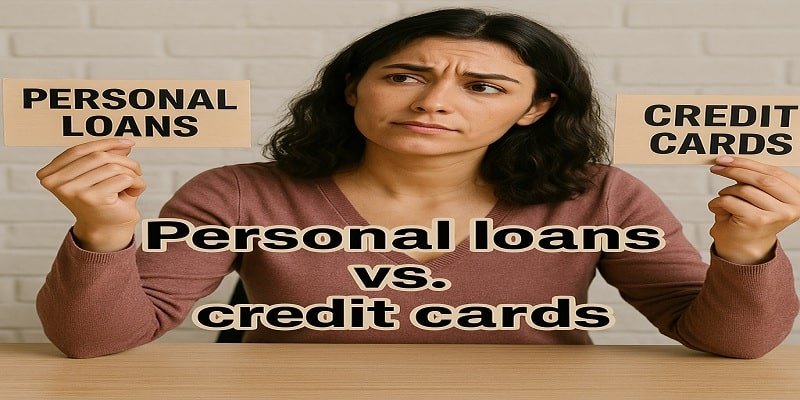“Personal loans vs credit cards”
Personal loans vs credit cards: When you need extra cash, two common options come to mind: personal loans and credit cards. Both can help cover expenses, but they work very differently. Understanding these differences can help you choose the best option for your financial needs.
In this guide, we’ll explain the 10 key differences between personal loans and credit cards to help you decide which option is appropriate for your situation. We’ll also share some personal loan tips and credit card strategies to make the most of your borrowing decisions.
1. How they work: lump sum vs. revolving credit
Personal loans: lump sum
When you take out a personal loan, you get the full amount upfront. You then repay it in fixed monthly installments over a set period of time (usually 1 to 7 years).
✅ Best suited for: For large, one-time expenses (e.g., home renovations, debt consolidation, medical bills).
Credit cards: Reusable credit line
A credit card gives you a revolving credit line. You can borrow up to your limit, pay it off, and borrow again. There’s no set repayment schedule—just a minimum payment each month.
✅ Best suited for: For everyday expenses, emergencies, or small, ongoing expenses.
🔗 Learn more about how personal loans work at the Consumer Financial Protection Bureau (CFPB).
2. Interest rates: Fixed vs. variable
Personal loans: Fixed rates
Most personal loans come with fixed interest rates, which means your monthly payment stays the same. Rates typically range from 6% to 36%, depending on credit score and lender.
Credit cards: Variable rates
Credit cards typically have a variable annual percentage (APR), which can change with market conditions. Rates often range from 16% to 25%, but can be higher for those with poor credit scores.
Pro tip: If you need regular payments, a personal loan is safer. If you can repay the outstanding balance quickly, a credit card may be the right choice for you.
3. Repayment terms: Structured vs. flexible
Personal loans: Fixed timeframe
You repay a personal loan in equal monthly installments over a set period of time (e.g., 3 or 5 years). Missing payments can affect your credit score.
Credit cards: no fixed expiration date
With a credit card, you can carry an outstanding balance indefinitely (although it’s costly because of the interest). You only have to make the minimum payment (usually 1-3% of the outstanding balance).
Warning: Making only the minimum payment on a credit card can lead to long-term debt!
4. Fees and costs: upfront vs. ongoing
Personal loans: origination fee
Some lenders charge an origination fee (1% to 8% of the loan amount). There’s usually no penalty for early repayment.
Credit Cards: Annual Fees and Penalties
Many credit cards charge the following fees:
- Annual fee (from $0 to $695 for premium cards)
- Late fee (up to $40)
- Balance transfer fee (3% to 5%)
🔗 Compare personal loan fees on NerdWallet.
5. Credit Impact: Various Impacts on Your Score
Personal Loans: Installment Credit
- Can boost credit mix (helps your score).
- Making on-time payments leads to a better payment history.
- Get hard inquiries when applying.
Credit Cards: Revolving Credit
- High balances impact credit utilization (aim for less than 30%).
- Late payments hurt credit scores.
- Frequent applications can lower your score.
Tip: Use a personal loan to pay down credit card debt and reduce utilization.
6. Borrowing limits: high vs. low
Personal loans: larger amounts
You can often borrow from $1,000 to $100,000, depending on your income and credit.
Credit cards: lower limits
Credit limits vary, but typically range from $500 to $30,000 (higher for excellent credit).
Do you need to make a large purchase? A personal loan might be better than maxing out a card.
7. Speed of funding: fast vs. instant
Personal loans: 1-7 days
Approval can take anywhere from hours to several days, and funds can arrive within 1-7 business days.
Credit cards: instant use
Upon approval, you can use the credit card immediately (or get virtual card access immediately).
Do you need emergency cash? Credit cards can be faster than personal loans.
8. Debt Consolidation: Which is Better?
Personal Loans: Best for Consolidation
- Lower interest rates than credit cards.
- Fixed payments make it easier to budget.
Credit Cards: Balance Transfers
- Promo offers (12-18 months) with 0% annual percentage rate (APR) can save interest.
- But there are high fees (3%-5%), and rates go up after the promo ends.
🔗 Check out the top balance transfer cards at Bankrate.
9. Flexibility: Reusability
Personal Loans: Once and Done
Once repaid, you’ll have to reapply for a new loan.
Credit Cards: Reusable
You can continue to use your card as long as the account is open.
Do you need constant access to funds? A credit card offers more flexibility.
10. Best Uses: When to Choose Each
If you…
- Need a large, one-time expense (e.g., wedding, home repairs).
- Need fixed payments and a set payoff date.
- Are consolidating high-interest credit card debt.
If you…
- Need short-term financing (and can pay it off quickly) choose a credit card.
- Need rewards (cash back, travel points).
- Need emergency funds immediately.
Final Thoughts: Which is Right for You?
Personal loans and credit cards both have their pros and cons. If you need a larger amount of money with predictable payments, a personal loan may be better. If you want flexibility and rewards, a credit card may be right for you—just avoid carrying a balance.
Before you decide: Personal loans vs credit cards
✔ Compare interest rates (check out LendingTree).
✔ Calculate the total cost (fees + interest).
✔ Check your credit score (the higher the score, the better the interest rate).
By understanding these 10 key differences, you can make a smart borrowing choice that fits your financial goals!
Did you find this helpful? Share your thoughts below or ask any questions about personal loans vs. credit cards!
FAQs: Personal Loans vs Credit Cards
1. Which is better for debt consolidation: personal loans or credit cards?
Personal loans are typically better for debt consolidation because of lower fixed interest rates. However, a 0% APR balance transfer credit card can save money if you pay off the debt before the promo period ends.
2. Do personal loans or credit cards have higher interest rates?
Credit cards typically have higher APRs (16%-25%+) than personal loans (6%-36%). However, borrowers with poor credit may face higher rates on both.
3. Can I use a personal loan or credit card in an emergency?
Yes, but credit cards provide instant access, while personal loans take 1-7 days. If timing is a concern, a credit card may be better.
4. Which hurts my credit score more: personal loans or credit cards?
Both impact your score, but maxing out a credit card hurts more because it increases credit utilization (30% of your score). A personal loan can help by diversifying the credit mix.
5. Can I repay a personal loan with a credit card?
Most lenders do not accept credit card payments for personal loans. However, you can use a balance transfer card (with fees) to convert a high-interest loan to a card with a 0% annual percentage rate (APR).
More Like This-


